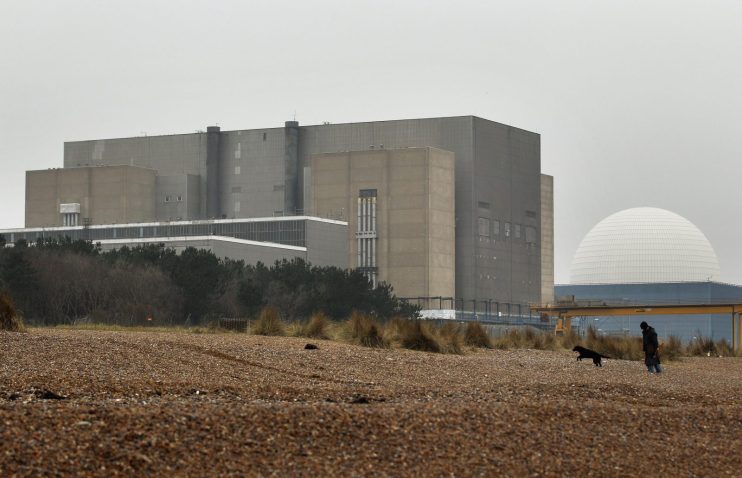Government enters funding talks with EDF over Sizewell C nuclear plant

The government has today confirmed that it has entered talks with EDF over funding options for the Sizewell C nuclear power station in Suffolk.
The announcement, which came as ministers unveiled the long-awaited energy white paper, could see the government take a financial stake in the project.
It comes after months of uncertainty regarding the future of the UK’s nuclear stations, which many consider to be central to Boris Johnson’s climate change commitments.
Twin-reactor plant Sizewell C is a clone of Hinkley Point C in Somerset, and could provide up to seven per cent of the country’s electricity.
At the moment, the project, which is slated to cost around £20bn, is part-funded by Chinese state-owned firm CGN.
However, in recent weeks there have been reports that the company is looking to pull out of the plant amid a worsening of relations between London and Beijing.
Until this morning, doing so would have called the future of the project into question, a potentially grave blow for the nuclear industry in this country.
Tom Greatrex, Chief Executive of the Nuclear Industry Association, said: “The Government’s decision to enter advanced negotiations with EDF on Sizewell C is very good news for our environment and our economy.
“Sizewell is a vital next step towards the net zero power mix we need for the future. As well as at least 60 years of constantly available clean electricity, this project will provide thousands of highly skilled, well paid and long term jobs across the supply chain, at a time when they are badly needed.”
Unions GMB and Unite both welcomed the talks, saying that the project could create 25,000 jobs – and 1,500 apprenticeships – during the construction phase.
But representatives for the Stop Sizewell C campaign pointed out that the talks were no guarantee the project would go ahead.
“As Alok Sharma said, this is not a green light to build Sizewell C and the idea that it could provide value for money is pie in the sky”, said campaigner Alison Downes.
“Costing at least £20bn, Sizewell C remains too slow and expensive to help our climate emergency, and both the government and any pension funds considering the project must beware the reputational risk of investing in a still unproven reactor design that even the French are abandoning.”
At the moment, the UK has eight working power plants, providing around 20 per cent of the country’s power, but four of these are due to shut by 2024.
In recent years, a number of newbuild projects championed by former Tory governments have stalled, including Wylfa in north Wales, which Japanese firm Hitachi pulled out of in the summer.
With officials still consulting on a new funding model – the Regulated Asset Base – which would see consumers pay for the project through higher bills – the sector seemed to have reached a standstill.
Before the Open newsletter: Start your day with the City View podcast and key market data
But last week the government’s climate advisers said that the country would need to develop eight gigawatts of new nuclear power by 2035 in order to hit its climate targets.
New plan a ‘decisive shift’ away from fossil fuels
Alongside the nuclear commitment, the white paper will also lay out a number of extra pledges, which it said would support 220,000 jobs around the country over the next decade.
These include a plan to save consumers money through a system which automatically switches them to a lower energy tariff.
In addition, it confirms that the UK will set up its own Emissions Trading Scheme (ETS) from 1 January to replace the EU ETS, ruling out the prospect of a carbon tax.
The replacement scheme will be more ambitious than the original, with the cap on emissions allowed within the system will be reduced by 5 per cent from day one.
The government also extended its commitments to developing carbon capture and storage (CCS) technologies, including plans to bring one such project online by 2030.
It is hoped that the development technology, alongside other low-emissions energy sources such as hydrogen power, can support the North Sea oil and gas industry through the transition away from fossil fuels.
The paper also revealed that a North Sea Transition deal laying out these plans would be signed in the first half of 2021.
Energy executives welcomed the new commitments, with SSE chief executive Alastair Philips-Davies commenting:
“Cost efficient renewables coupled with cutting edge carbon capture and storage technology and a robust and stable carbon price is the pathway to net zero and we welcome the Government’s focus on all three.
Today’s commitments follow shortly after Johnson’s 10 point climate change plan, which was released last month, and included a pledge to ban the sale of all new petrol and diesel cars by 2030.
Business secretary Alok Sharma said: “Today’s plan establishes a decisive and permanent shift away from our dependence on fossil fuels, towards cleaner energy sources that will put our country at the forefront of the global green industrial revolution.
“Through a major programme of investment and reform, we are determined to both decarbonise our economy in the most cost-effective way, while creating new sunrise industries and revitalising our industrial heartlands that will support new green jobs for generations to come.”